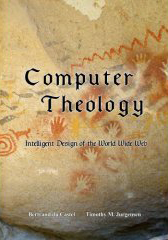PRESS
COMPUTER THEOLOGY |
||||
|
employee card as a
means of unlocking privileged information contained on the card. When the
control system has obtained the information it wants, generally to authenticate
the identity of the card bearer to its satisfaction, the employee removes the
card. For the transcendent personal device to function as an effective
fiduciary on behalf of its bearer, this communication exchange between such a
control system and the transcendent personal device must be of a peer-to-peer
variety. The transcendent personal device must be able to initiate interactions
with external systems on its own terms. It cannot merely respond to requests or
commands if it is to truly effect complex policy operations on behalf of its
bearer. Today, some secure cores have already started on the path to
liberation. A Subscriber Identity Module in a GSM mobile phone is able to
piggyback a note on a normal command response that says in effect, “Now, ask me
what to do next.” Further, if the phone also has contactless payment via a
wireless protocol called Near-Field Communication (NFC), the phone can get
involved in a peer-to-peer payment transaction. As the current evolution
progresses further, transcendent personal devices will therefore be autonomous
agents, in that they will be able to start a communication exchange just as the
humans they represent do. Subordinate only to the need of
transcendence, self-actualization drives individuals to assert eminence over
their personal situations. Maslow characterized self-actualizing individuals in
terms of a number of traits that collectively give rise to this interpretation.
Again, extracting concepts from his Toward
a Psychology of Being, we can include among these traits that of assessing
the situation presented by the direct environment in objective rather than
subjective terms and interpreting the presentation of issues as opportunities
for solutions as opposed to threats to be avoided at all costs. Maslow further
suggested that self-actualized individuals perceive the world as a pursuit of peak experiences rather than ongoing
acceptance of the mundane. When viewed from the perspective of the transcendent
personal device, we see the direct manifestation of our more generally stated
requirement that the device must function as a fiduciary for its bearer, not
for some other external entity. Moreover, this need requires the ability of the
device to initiate an interaction environment with other parties as opposed to
simply responding to them. Through its sensori-motor facilities, the
transcendent personal device should actively engage the dynamic world that it
finds itself in. The fulfillment of this need will evoke a variety of
subordinate needs that will in turn evoke specific requirements for technical
capabilities to satisfy the appetites derived from these needs. Indeed, many of
these capabilities will present as extremely innovative departures from the
capabilities of current personal electronic devices. According to Maslow’s original discussions regarding the human hierarchy of needs, creativity is another manifestation of self-actualization. He makes the observation that the display of creativity is not necessarily an indicator of either physical or psychological health, using as illustrations of this fact a number of writers and artists known to stray rather far afield from what was perceived to be “normal” conditions during their lifetimes. Within the transcendent personal device, we would anticipate that it is a function of cognitive needs to monitor and maintain the normalcy of health of the system and its connections to the outside world, including to its bearer. Self-actualization needs of the transcendent personal device will address the capabilities of the system to determine and apply policy in creative ways in the face of threats of either an anticipated or an unanticipated nature. This suggests that perhaps the most far reaching facility required of the transcendent personal device is the capability for it to act not just on behalf of its bearer, but to act in seamless concert with that bearer. More basic needs should address the necessity for cognitive facilities of the transcendent personal device to be in optimum synchronization with the sensori-motor system of the computer as well as with the human bearer of the computer. The facilities of self-actualization must make use of that synchrony to effect policy on behalf of the bearer. |
||||
|
||||
© Midori Press, LLC, 2008. All rights reserved for all countries. (Inquiries) The contents of ComputerTheology: Intelligent Design of the World Wide Web are presented for the sole purpose of on-line reading to allow the reader to determine whether to purchase the book. Reproduction and other derivative works are expressly forbidden without the written consent of Midori Press. Legal deposit with the US Library of Congress 1-33735636, 2007.
|
ComputerTheology Intelligent Design of the World Wide Web Bertrand du Castel and Timothy M. Jurgensen Midori Press, Austin Texas 1st Edition 2008 (468 pp) ISBN 0-9801821-1-5 |
Book available at Midori Press (regular) |
